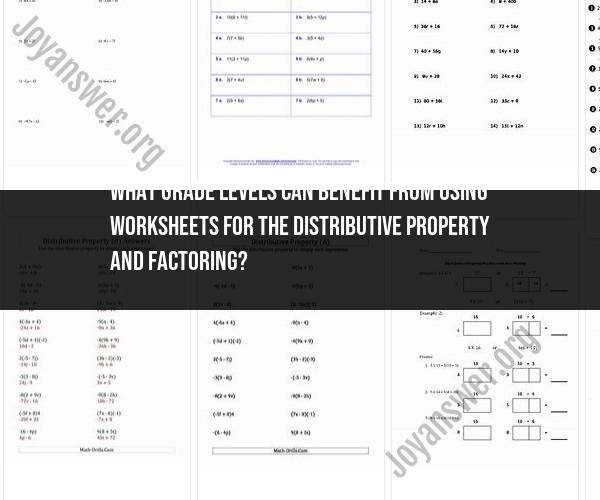What grade levels can benefit from using worksheets for the distributive property and factoring?
Worksheets for the distributive property and factoring can be designed to target a range of grade levels, from middle school to high school and beyond. Here's how they can be adapted for different grade levels:
Middle School (Grades 6-8):
- In middle school, students typically begin learning about the distributive property and basic factoring.
- Worksheets for this level might focus on:
- Distributive property with single-variable expressions.
- Factoring expressions involving simple linear and quadratic terms.
- Basic algebraic equations that require applying the distributive property and simple factoring techniques.
Early High School (Grades 9-10):
- High school freshmen and sophomores can delve deeper into algebraic concepts.
- Worksheets might include:
- More complex applications of the distributive property, such as distributing a binomial into a binomial.
- Factoring trinomials of the form ax^2 + bx + c where a ≠ 1.
- Solving quadratic equations using factoring.
Late High School (Grades 11-12):
- Worksheets for upper-grade levels can be more challenging.
- Topics may include:
- Advanced factoring techniques, like factoring by grouping, perfect square trinomials, and the difference of cubes.
- Factoring with higher-degree polynomials.
- Solving equations involving multiple steps of factoring.
- Real-world applications of the distributive property and factoring.
Advanced Courses (Pre-Calculus, Algebra II, and Beyond):
- Students in advanced courses can explore more complex algebraic concepts.
- Worksheets may cover:
- Factoring involving polynomial long division and synthetic division.
- Factoring involving complex numbers.
- Advanced polynomial equations and inequalities.
- Applications in calculus, such as limits and derivatives.
The key is to align the difficulty level of the worksheets with the grade level and the specific curriculum. Worksheets can be tailored to provide appropriate challenges and practice opportunities for students at different stages of their algebra education.












